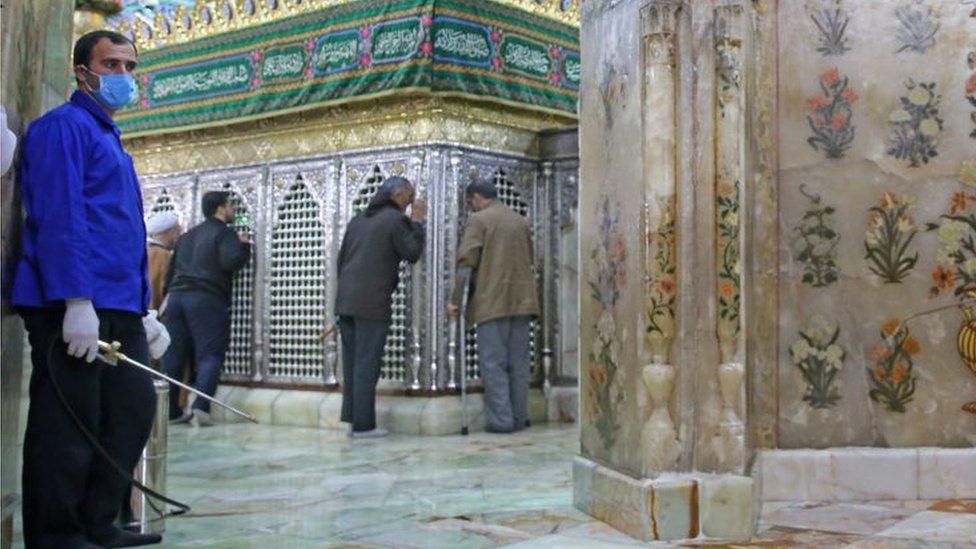Coronavirus: Iran holy-shrine-lickers face prison
- Published

Two men in Iran who defied coronavirus health warnings could be jailed and flogged after videos circulated of them licking holy shrines.
In one of the videos, viewed more than a million times on Instagram, a man is seen at the Masumeh shrine in Qom, saying, "I'm not scared of coronavirus", before licking and kissing the gates.
In another video at a shrine in Mashhad a man is filmed saying he is there to lick the shrine, "so the disease can go inside my body and others can visit it with no anxiety".
MP Hasan Nowrozi said: "Those doing such unconventional acts are publishing fake and superstitious news against the officials in the country.
"Such people would face two months to two years [in] jail and up to 74 lashes as punishment."
The arrests come after videos of the men were shared on social media by Iranian journalist and activist Masih Alinejad.
"Arresting these two people is not enough as the religious centres are still open in Qom and other cities where people are suffering from coronavirus" she told the BBC.
Iran has recorded one of the highest numbers of coronavirus cases outside China.
While some measures have been taken to protect visitors - such as disinfecting holy shrines - there hasn't been an outright closure of the sites.
Some religious clerics believe the shrines, including the Masumeh shrine in Qom, have divine powers that can cure diseases.
Millions of people visit the shrines every year, spending many hours praying near them, or kissing and touching them.
Social media users have criticised the Iranian authorities for failing to take the same kind of precautionary measures as other countries to protect people.
Last week, Saudi Arabia announced it was temporarily stopping Muslims from visiting the holy cities of Mecca and Medina and, in parts of Italy, church masses have been suspended.
"The grand ayotollahs should react. Rapid reaction is needed," posted one Twitter user.
While another tweeted in support of those wishing to continue visiting religious sites.
"Our thoughts are based on divine teachings, and Shia is the most pure religion in the world, and the mosques are at the front combating coronavirus."
In affected areas in Iran, schools and universities have been closed and in Tehran the use of shisha pipes has been banned.
While people are being told not to attend large gatherings and the use of masks and hand gels is being encouraged, Iranian President Hassan Rouhani has said there are no plans to quarantine entire cities and towns.
On Monday, a World Health Organization (WHO) team arrived in Iran to provide help and support including protective equipment for health-care workers and diagnostic kits.
Meanwhile, Iranian doctors and nurses have started an online dance challenge in an effort to boost the morale of medical teams and people amid the coronavirus outbreak.
Journalist Reza Haqiqatnejad posted a video on Twitter showing a nurse dancing in a hospital.
Many users posted positive comments thanking medical personnel, and wishing them good health.
- Published6 October 2021
- Published28 February 2020
- Published25 February 2020
- Published27 March 2020
- Published2 March 2020